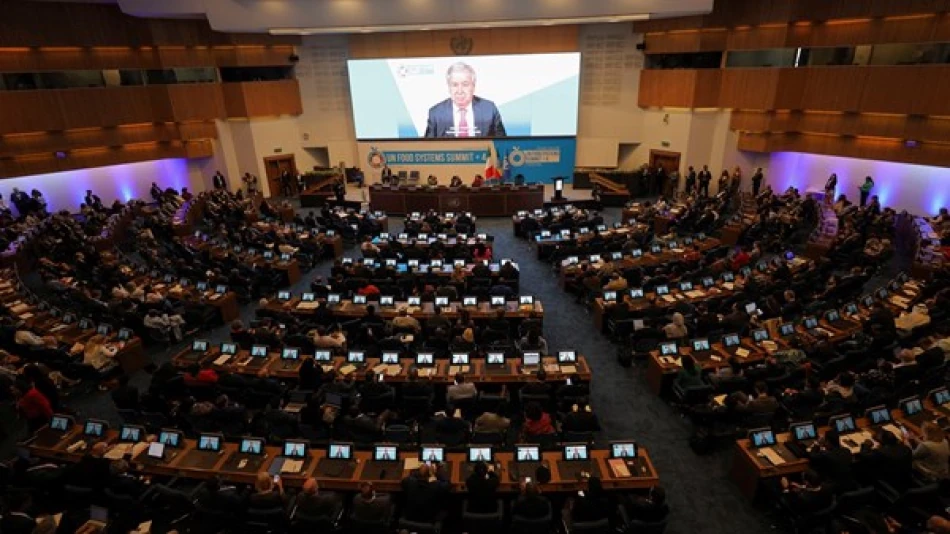
UN Chief Warns Against Using Hunger as a Weapon of War
UN Chief Condemns Weaponization of Hunger as Global Food Crisis Deepens
UN Secretary-General António Guterres delivered a stark warning against using hunger as a weapon of war during a major food security summit in Ethiopia, highlighting how conflicts and climate change are driving unprecedented levels of global food insecurity. The summit, co-hosted by Ethiopia and Italy, underscores growing international alarm over food crises that now affect over 735 million people worldwide.
A Diplomatic Push Against Starvation Tactics
Speaking via video link to the UN Food Systems Conference in Ethiopia, Guterres emphasized that "hunger should never be accepted as a weapon of war." His remarks come as multiple conflicts worldwide have seen deliberate targeting of food infrastructure and agricultural areas, tactics that violate international humanitarian law but remain difficult to prosecute.
The summit was jointly opened by Ethiopian Prime Minister Abiy Ahmed and Italian Prime Minister Giorgia Meloni, reflecting a strategic partnership between Africa and Europe on food security issues. This collaboration signals recognition that food crises in one region inevitably create ripple effects globally through migration, economic instability, and security threats.
Climate and Conflict: A Devastating Combination
Guterres highlighted the dual drivers of modern food insecurity: climate change and armed conflict. "Climate change affects crops, supply chains, and humanitarian aid. Conflicts continue to spread hunger," he noted, drawing attention to how these factors compound each other in a vicious cycle.
The Modern Face of Food Warfare
The weaponization of hunger has become increasingly sophisticated in contemporary conflicts. From the siege tactics in Syria and Yemen to the targeting of grain facilities in Ukraine, deliberate starvation has emerged as a strategic tool. Unlike traditional sieges of medieval warfare, modern food warfare exploits global supply chains and climate vulnerabilities to maximize civilian suffering.
Ukraine's experience offers a stark example: Russian attacks on grain storage facilities and the Black Sea grain corridor have threatened food supplies not just domestically, but across Africa and the Middle East, where Ukrainian wheat feeds millions.
Ethiopia's Strategic Role in Global Food Security
The choice of Ethiopia as summit host carries symbolic weight. The country has experienced both devastating famines and remarkable agricultural transformation over recent decades. Ethiopia now serves as headquarters for the African Union and positions itself as a bridge between African food producers and global markets.
However, Ethiopia also exemplifies the challenges Guterres described. The country faces recurring droughts linked to climate change, while the recent conflict in Tigray demonstrated how quickly political instability can trigger humanitarian crises. An estimated 20 million Ethiopians currently require food assistance.
International Law Meets Practical Reality
While international humanitarian law explicitly prohibits using starvation as a method of warfare, enforcement remains weak. The 1977 Additional Protocol to the Geneva Conventions makes it illegal to attack food sources, but prosecutions are rare and often come years after the damage is done.
The gap between legal prohibition and practical prevention represents one of the international community's most pressing challenges. Unlike other war crimes, hunger warfare often appears as collateral damage rather than deliberate strategy, making legal accountability difficult to establish.
Economic Implications Beyond Humanitarian Concerns
Food insecurity carries massive economic costs that extend far beyond immediate humanitarian needs. The World Bank estimates that malnutrition costs the global economy over $3.5 trillion annually through reduced productivity, increased healthcare costs, and educational setbacks.
For investors and policymakers, food crises create multiple risk factors: currency instability in affected regions, commodity price volatility, increased migration pressures, and potential for social unrest. The 2008 food price crisis, which contributed to political upheavals across multiple countries, demonstrated how quickly food insecurity can translate into broader instability.
A Call for Systemic Change
Guterres's warning reflects growing recognition that traditional humanitarian responses are insufficient for addressing modern food crises. The summit's focus on food systems rather than just emergency aid suggests a shift toward addressing root causes rather than symptoms.
This approach acknowledges that sustainable food security requires coordinated action on climate adaptation, conflict prevention, trade policy, and agricultural innovation. The partnership between Ethiopia and Italy exemplifies the kind of North-South cooperation that experts argue is essential for building resilient global food systems.
As climate change intensifies and conflicts evolve, the international community faces a critical test of whether it can move beyond condemning hunger warfare to actually preventing it.
Most Viewed News

 Layla Al Mansoori
Layla Al Mansoori






